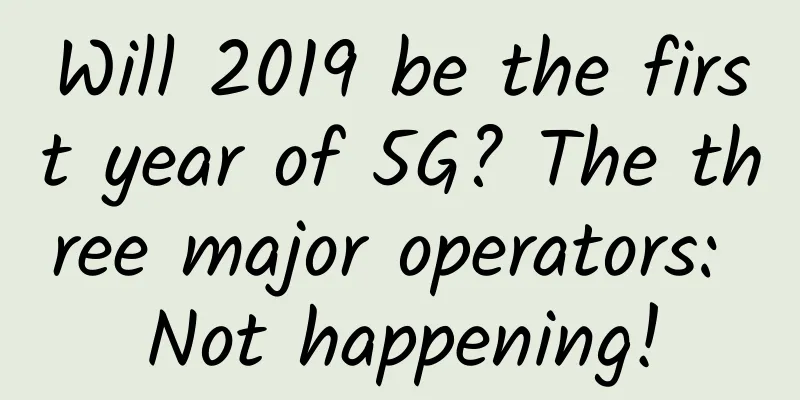Say goodbye to roaming charges. What should the three major operators do in the face of rising cost pressures and reduced revenues?

|
On June 22, China Mobile, China Unicom and China Telecom, the three major operators, successively issued announcements, announcing that they would cancel data "roaming" fees on July 1. This year's government work report proposed to increase the speed and reduce the cost of the network, achieve full coverage of high-speed broadband in urban and rural areas, expand the scope of free Internet access in public places, significantly reduce the use fees of home broadband, enterprise broadband and dedicated lines, cancel the data "roaming" fee, and reduce the mobile network data charges by at least 30% within the year. Since then, the Ministry of Industry and Information Technology and the three major operators have successively stated that they will achieve the goal of officially canceling the difference in national and local traffic charges before July 1. China Mobile China Unicom China Telecom The so-called data "roaming" fee actually refers to the difference between the data tariff in the province or local area and the national data tariff. Canceling the data "roaming" fee means canceling the difference between the national and local data tariffs. Say goodbye to roaming charges, what should operators do next? 1. From offline to online, start the channel war For a long time, offline channels have been the main battlefield for operators. However, with the cancellation of roaming fees, operators' offline channels will face greater cost pressure and revenue reduction risks. The need to improve online channel handling capabilities is becoming more and more urgent, and it is also an important part of operators' cost reduction and efficiency improvement. It is not easy for operators to achieve online transformation. On the one hand, operators have a single online portal and lack diversified and convenient online marketing portals. On the other hand, operators do not adequately divert traffic from offline to online, and fail to guide users to form online consumption habits. At the same time, operators’ own online channels lack content, and their business innovation capabilities need to be improved urgently. They are not integrated enough with BATJ and other cross-industry platforms, and it is difficult to break through the BATJ consumer application barriers. Operators should first focus on optimizing business processing procedures and reasonably guide users to use online modes such as electronic channels, ultimately achieving cost reduction and efficiency improvement. 2. In the 5G era, unlimited packages will become mainstream After the roaming fee disappears, the application of mobile phone cards will no longer be subject to geographical restrictions, and operators will face the problem of user loss. How to stabilize the user's online rate has always been the focus of operators' operations. For users, only when they enjoy tangible benefits will they be willing to choose to stay. The most effective way is to vigorously promote the "unlimited" package. In the future 5G era, traffic charges will continue to decline. Capturing users in advance through "unlimited" packages will help operators safely pass the difficult transition period from 4G to 5G. 3. Layout overseas business and occupy the commanding heights At present, the speed reduction fee is only at the stage of reducing domestic charges. After leaving the country, most users choose to buy local mobile phone cards or rent wifi. The 2018 Government Work Report pointed out that since 2013, the number of outbound tourists in my country has increased from 83 million per year to more than 130 million per year, and will continue to grow in the future. It can be seen that international roaming will contribute more revenue and profits to operators. Retaining and tapping the consumption potential of outbound travel users is crucial to the future competitive landscape of operators. |
Recommend
WiFi is a good addition to SD-WAN, but not a must
The software-defined wide area network (SD-WAN) m...
If operators want to make profits, they should eliminate 4G packages first.
[[346837]] After 2019, the first year of 5G, and ...
Istio configuration security: How to avoid misconfiguration
Istio is a powerful service mesh solution that pr...
Net loss of fixed-line broadband users: China Unicom sounds red alert
December 22 news (Yue Ming) Recently, the three m...
Animation explains TCP. If you still don’t understand, please hit me up
Preface The TCP three-way handshake process is a ...
Enterprise Servers, Storage, and Networking: The Building Blocks of Modern IT Infrastructure
A strong and efficient IT infrastructure is essen...
How to solve Wi-Fi authentication problems?
Many people have encountered this problem when co...
Essential HTTP knowledge for front-end developers! Just read this article! !
HTTP Origin HTTP was initiated by Tim Berners-Lee...
5G development is gradually spreading like wildfire, and China is expected to take the lead
5G is a new generation of communication technolog...
LOCVPS new Japanese SoftBank line VPS, native IP, 20% discount promotion
After the Lunar New Year, LOCVPS launched a new V...
Security advantages and challenges of HTTP3 protocol
HTTP/3 is the third official version of the Hyper...
5G changes everything. 5G will have a huge impact on many areas of life
From low-latency, ultra-high-speed bandwidth to i...
Thoroughly understand gateways, DNS, routing and related concepts: in-depth analysis of network communication basics
In the field of network technology, "gateway...
How fiber optics helps businesses and people in the digital age
How fiber optics helps businesses and people in t...
5G development still has a long way to go
The construction and development of 5G has gone t...
![[Black Friday] Megalayer: Hong Kong/Singapore VPS flash sale 9.9 yuan/month, Hong Kong server 199 yuan/month, top up and get 10% back](/upload/images/67cabcfaacf10.webp)








